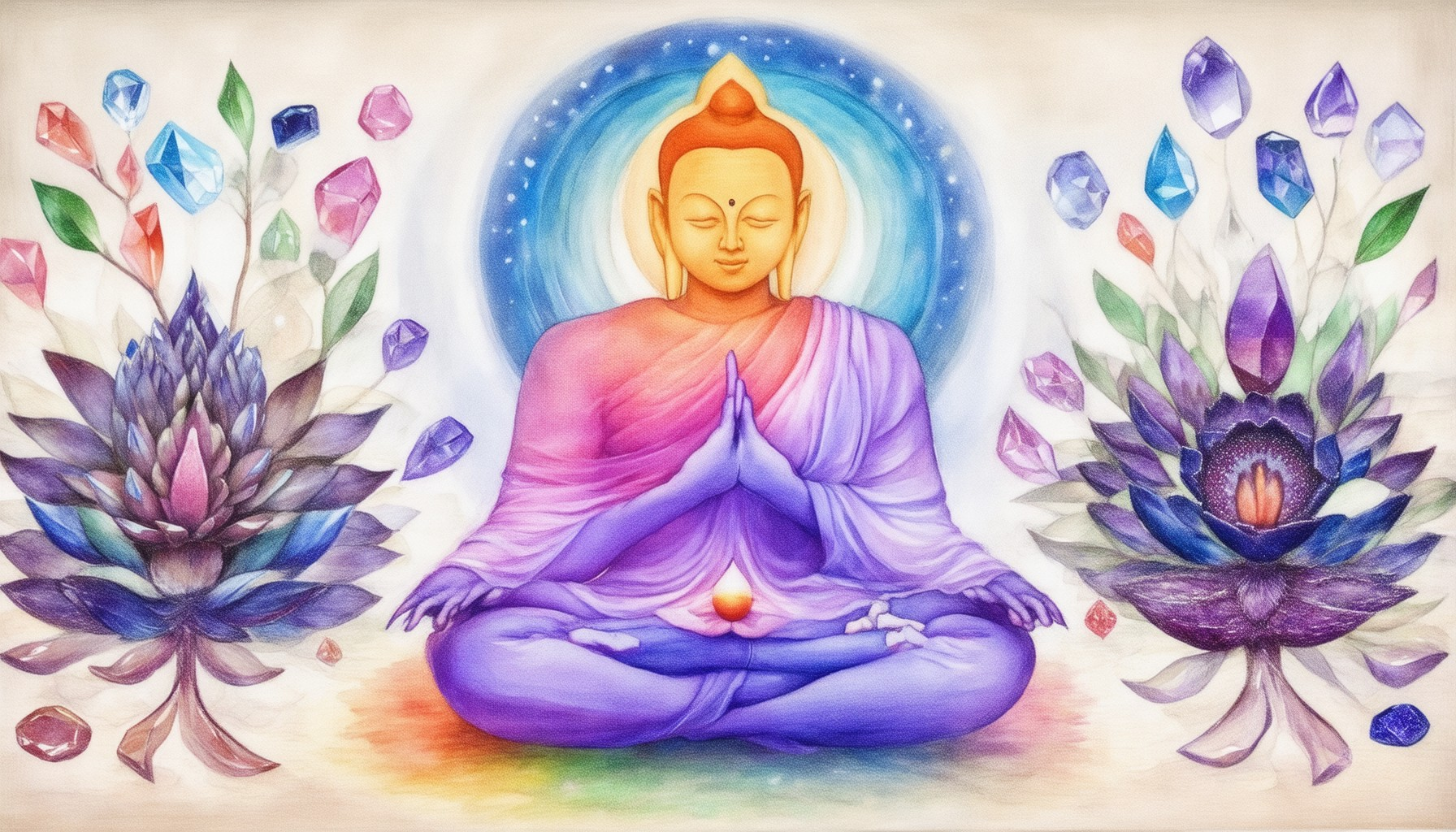In today’s fast-paced world, prioritizing self-love and mindfulness has become essential for maintaining emotional well-being and fostering healthy relationships. While many of us strive to care for others, often neglecting our own needs, the practice of mindfulness offers a powerful tool for enhancing self-love and self-esteem. Research shows that mindfulness practices, such as meditation and breathing exercises, can significantly improve mental health by cultivating compassion and reducing stress. However, understanding the deeper connection between mindfulness and self-love requires exploration of its psychological benefits and how it intersects with broader concepts like Buddhist teachings and chakra systems. This guide delves into the intricate relationship between self-love and mindfulness, examining how neglecting self-care can lead to emotional struggles and how mindfulness can serve as a catalyst for personal growth. From Buddhist insights on compassion to the role of crystals in promoting emotional healing, this comprehensive exploration provides actionable strategies for mastering self-love and mindfulness, ensuring a holistic approach to improving your overall well-being.
Key Takeaways
– Solar Plexus Chakra and Self-Love: The Solar Plexus Chakra is central to self-love, boosting confidence and personal power.
– Heart Chakra’s Role: While the Heart Chakra is known for unconditional love, it supports self-love by fostering emotional well-being.
– Chakra Balance for Self-Love: Practice affirmations, engage in confidence-building activities, and incorporate meditation for overall energy flow.
– Crystals for Self-Love: Use Rose Quartz, Amethyst, and Moonstone to enhance self-love and emotional balance.
– Balancing for Loneliness: The Heart Chakra’s imbalance can cause loneliness; balancing it through meditation, journaling, and acts of kindness reduces isolation.
– Holistic Approach: Combining chakra balance, crystal therapies, and mindfulness practices leads to improved self-love and emotional fulfillment.
How Does Mindfulness Contribute to Self-Love?
Mindfulness plays a vital role in fostering self-love by helping individuals develop a deeper connection with themselves. Through regular practice, mindfulness cultivates self-awareness, empathy, and compassion, all of which are essential components of self-love. Here’s how mindfulness contributes to self-love:
- Cultivating Self-Awareness :
Mindfulness encourages individuals to observe their thoughts, emotions, and behaviors without judgment. This self-awareness allows people to recognize their worth and appreciate their strengths and qualities, fostering a positive self-perception. - Reducing Negative Thought Patterns :
Mindfulness helps interrupt the cycle of negative self-talk that often leads to self-doubt or criticism. By focusing on the present moment, individuals can challenge irrational thoughts and replace them with kind, supportive statements. - Promoting Emotional Balance :
Regular mindfulness practice reduces stress and anxiety, which can cloud judgment and hinder self-love. A calm and centered mind is better equipped to engage in self-compassionate behaviors. - Encouraging Gratitude :
Mindfulness often includes gratitude practices, where individuals reflect on the positive aspects of their lives. This fosters a sense of abundance and appreciation, further enhancing self-love. - Improving Relationships with Others :
Practicing mindfulness can lead to greater empathy and understanding in interactions, which indirectly supports self-love by reinforcing feelings of connection and worthiness. - Altering Brain Chemistry :
Mindfulness activities, such as meditation, have been shown to increase levels of serotonin and decrease cortisol. These changes promote emotional stability and a healthier perception of oneself.
To explore these concepts further, visit Chris and One for practical tips and resources on mindfulness and self-improvement. Their platform offers actionable insights and guided practices to help you cultivate self-love and mindfulness in your daily life.
What Does Lack of Self-Love Lead To?
A lack of self-love can manifest in various ways, leading to a cycle of emotional and relational struggles. Here’s a breakdown of the potential consequences:
- Emotional Suffering : When self-love is absent, individuals often struggle with low self-esteem, feelings of inadequacy, and chronic dissatisfaction. Over time, this can lead to anxiety, depression, and a general sense of emptiness.
- Difficult Relationships : Lacking self-love can make it challenging to form and maintain healthy relationships. People may attract partners who mirror their own self-doubt or seek to fill a void they don’t recognize.
- Unfulfilled Potential : Without self-love, individuals might neglect their goals and passions. They often feel stuck, unable to pursue what truly makes them happy due to fear of failure or judgment.
- Lack of Motivation : Self-love is essential for motivation. Without it, people tend to feel exhausted, uninspired, and less likely to take initiative in life.
- Health Issues : Chronic stress and poor self-care habits, often stemming from lack of self-love, can lead to physical health problems such as high blood pressure, weakened immunity, and burnout.
- People-Pleasing Behavior : To gain approval or avoid conflict, individuals may neglect their own needs, leading to a pattern of putting others’ needs before their own.
To address these challenges, it’s crucial to cultivate self-love through practices like mindfulness, setting personal boundaries, and engaging in activities that bring joy and fulfillment. Resources like Chris and One offer guided steps to help individuals reconnect with their true selves and build healthier relationships with others.
By prioritizing self-love, individuals can break free from these cycles and live more fulfilling, authentic lives.
What Does Buddhism Say About Self-Love?
Buddhism emphasizes self-compassion and the cultivation of loving-kindness towards oneself, much like it advocates for others. The core principle is to treat oneself with the same kindness and understanding as one would treat a friend or colleague. Here’s a breakdown of Buddhist teachings on self-love:
- Non-Judgmental Attitude : Buddhism encourages followers to view themselves without judgment, recognizing that everyone has imperfections and needs compassion. This perspective helps in fostering a more balanced and healthy self-view.
- Compassionate Action : Just as one would care for a dear friend, one should extend compassion to oneself. This includes being patient with mistakes and practicing self-forgiveness.
- Metta Meditation : A key Buddhist practice, Metta (loving-kindness) meditation focuses on developing compassion towards oneself and others. By regularly practicing this, individuals can cultivate a deeper sense of self-love and empathy.
- Interconnectedness : Buddhism sees all beings as interconnected. This understanding encourages practitioners to consider the impact of their actions on themselves and others, promoting ethical living as a means of self-care and community well-being.
- Ethical Living : Engaging in ethical behavior, such as honesty and kindness, not only benefits others but also fosters inner peace and self-respect.
To further explore self-love, check out these resources from Chris and One, which offer practical advice and guided practices to help you cultivate self-love effectively: Chris and One .
What Chakra is Associated with Self-Love?
The Solar Plexus Chakra is primarily associated with self-love. This chakra, located in the upper abdomen, governs personal power, confidence, and self-esteem, all of which are crucial components of self-love.
While the Heart Chakra is traditionally known for unconditional love and compassion, it plays a supportive role in fostering self-love by creating an emotional space conducive to giving and receiving love, including self-love.
Practical Steps to Balance Your Chakras for Self-Love
- Solar Plexus Chakra: Practice affirmations, wear yellow or gold jewelry, and engage in activities that boost your confidence and self-esteem.
- Heart Chakra: Engage in acts of kindness, practice gratitude, and surround yourself with positive influences to cultivate emotional well-being.
- Overall Energy Flow: Incorporate regular meditation, healthy eating, and adequate sleep to maintain the balance of all chakras, particularly focusing on the Solar Plexus and Heart Chakras.
For additional support in balancing your chakras and embracing self-love, consider exploring resources from Chris and One, which offer practical tips and tools for personal growth and relationship building.
Crystal Associated with Self-Love
Rose Quartz is often considered the crystal most associated with self-love due to its strong connection to the heart chakra and its ability to foster unconditional love and compassion toward oneself.
Amethyst, known for its calming and purifying properties, is also linked to self-love as it helps in connecting with higher consciousness and fostering a deep sense of self-appreciation and self-worth.
Moonstone, with its gentle, nurturing energy, is believed to aid in balancing emotions and promoting self-love by helping individuals understand and embrace their true selves.
These crystals can be held during meditation or worn in jewelry to help reinforce intentions around self-love and personal growth.
What Chakra Holds Loneliness?
The Heart Chakra (Anahata) is commonly associated with feelings of loneliness when it becomes imbalanced. This chakra governs love, compassion, and emotional connection, and when it is out of harmony, individuals may struggle to form meaningful relationships or feel disconnected from themselves and others.
Causes of Imbalance:
- Emotional Blockage: A blocked Heart Chakra can lead to difficulties in expressing or receiving love, resulting in feelings of loneliness.
- Social Withdrawal: Loneliness may arise when individuals withdraw from social interactions due to fear of rejection or past traumas.
Effects of Imbalance:
- Mental Health Issues: Chronic loneliness can contribute to mental health challenges such as depression and anxiety.
- Relationship Struggles: It may hinder the ability to form strong emotional bonds and foster a sense of isolation.
Balancing the Heart Chakra:
To address loneliness, it’s essential to balance the Heart Chakra through practices that promote emotional openness and connection:- Meditation: Regular meditation focused on compassion and love can help cultivate a more open-hearted mindset.- Journaling: Writing about personal experiences and emotions can provide insight and facilitate healing.- Nature Connection: Spending time in nature can remind us of our interconnectedness with the world around us.- Acts of Kindness: Volunteering or helping others fosters a sense of purpose and community connection.- Gratitude Practice: Reflecting on daily gratitude can shift focus toward positivity and reduce feelings of loneliness.
Conclusion:
Understanding the role of the Heart Chakra in loneliness is crucial for emotional well-being. By balancing this chakra, individuals can cultivate deeper connections with themselves and others, reducing feelings of isolation and fostering a more fulfilling life.









0 Comments